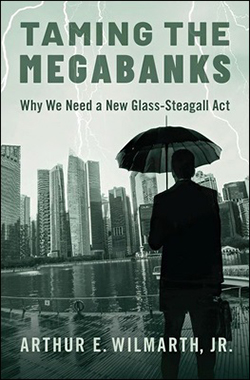By Pam Martens and Russ Martens: June 12, 2024 ~
 Yesterday, The Hill published an OpEd by the man who, literally, wrote the book on the megabanks: Arthur E. Wilmarth, Jr., Professor Emeritus of Law at George Washington University Law School. Wilmarth raised critical points on why these megabanks continue to pose unacceptable levels of risk to U.S. financial stability and need to dramatically boost their equity capital – notwithstanding their fierce lobbying and propaganda battle to overturn the proposed new capital rules by bank regulators.
Yesterday, The Hill published an OpEd by the man who, literally, wrote the book on the megabanks: Arthur E. Wilmarth, Jr., Professor Emeritus of Law at George Washington University Law School. Wilmarth raised critical points on why these megabanks continue to pose unacceptable levels of risk to U.S. financial stability and need to dramatically boost their equity capital – notwithstanding their fierce lobbying and propaganda battle to overturn the proposed new capital rules by bank regulators.
The forces of the universe seemed to align with Wilmarth’s gutsy OpEd yesterday. In a display of just how dangerously interconnected with derivatives these megabanks remain, their share prices tanked in tandem yesterday despite the S&P 500 and Nasdaq indexes each setting a new record high.
The contagion among the megabanks spread after French President Emmanuel Macron called snap parliamentary elections for June 30 and July 7 following far-right advances in the weekend’s elections to the European Parliament.
The mega French bank, Société Générale, lost 5.52 percent in New York trading while the largest French bank, BNP Paribas, lost 4.72 percent. That set in motion a tumble in megabanks in general with Citigroup leading the U.S. losers with a decline of 3.73 percent. JPMorgan Chase, whose Chairman and CEO Jamie Dimon is leading the lobbying push against higher capital rules, tumbled 2.63 percent. (See chart above for more of the contagion.)
Wilmarth makes the following critical points in yesterday’s OpEd:
On a percentage basis, megabanks are holding far less capital than community banks, even though they pose exponentially greater risks and receive serial bailouts. Wilmarth also highlights the under-appreciated reality of how the megabanks have contributed to exploding national debt levels in the U.S. He writes:
“Total federal debt nearly quadrupled from $9 trillion to $34 trillion between 2007 and 2023, due in substantial part to huge expenditures for combating financial crises. It is doubtful whether the federal government could shoulder comparable debt burdens during future crises without undermining the credibility of Treasury bonds and the U.S. dollar.”
Wilmarth also addresses the core incentive that motivates the megabanks’ top executives to rail against higher capital rules, writing as follows:
“Big banks vehemently oppose higher equity capital requirements because they reduce payouts to megabank executives. Much of the executive compensation paid by megabanks is linked to their return on equity (ROE). Adding more equity increases the denominator for calculating ROE, making it harder for executives to hit their ROE targets. Big-bank executives therefore have powerful motives to fund their banks’ operations with less equity and more debt.”
Wilmarth also links to two heart-stopping studies showing that “larger U.S. banks incur more severe losses from operational risk, and past losses from operational risk are good predictors of future losses at the same banks.”
Let that last sentence sink in carefully for a moment; then reflect on this. The largest bank in the U.S., JPMorgan Chase, gambled in derivatives in London in 2012, using depositors’ money at its federally-insured bank, and lost $6.2 billion of depositors’ money. JPMorgan Chase also held the business bank account for Bernie Madoff as he ran the largest Ponzi scheme in U.S. history out of the account. According to a report by the Government Accountability Office, the bank’s own customers lost $5.4 billion to the Madoff fraud. Then there were the revelations last year, brought in a federal lawsuit by the Attorney General for the U.S. Virgin Islands, that JPMorgan Chase had “actively participated” in Jeffrey Epstein’s sex trafficking of underage girls by providing tens of thousands of dollars in hard cash to him monthly for more than a decade without filing the legally mandated Suspicious Activity Reports (SARs) with the Financial Crimes Enforcement Network (FinCEN).
And yet, JPMorgan Chase is allowed by its regulators to hold a lower percentage of equity capital to assets than a sleepy little community bank.
If you agree that the current banking structure in the U.S. represents a threat to national security and economic stability, please contact your U.S. Senators today via the U.S. Capitol switchboard by dialing (202) 224-3121. Tell your Senators to hold immediate hearings on the dangerous structure of the U.S. banking system since the repeal of the Glass-Steagall Act in 1999, which has allowed giant federally-insured banks to be turned into derivative trading casinos.


